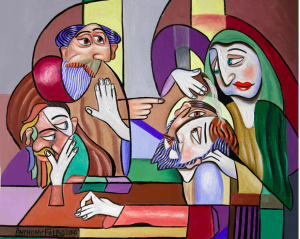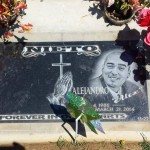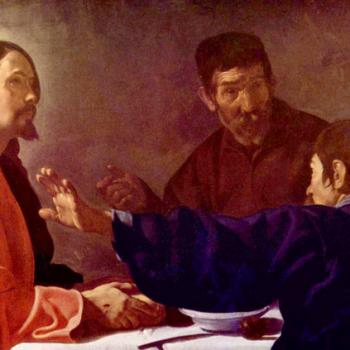So there’s the famous “last supper” of Jesus, complete with famous paintings and weekly remembrances. “Do this in remembrance of me.”
And then there’s the next-to-last supper. We don’t imitate it every week. But it, too, is a marked with words of remembrance: not a command that we imitate in order to remember Jesus, but a promise that what went down will be told in remembrance of her.

Her.
The final appearance of the most faithful character-type in the Gospel of Mark: the unnamed women. These are the ones who have been willing to serve rather than be served, who have exercised great faith in contrast to the fear of the disciples, who have given their very lives.
And now there comes a deed that will be told wherever the gospel is proclaimed. A deed that captures the very aspect of the gospel that the disciples continually reject.
Death Becomes Him
Mark has set this story in the middle of the plot to seize and kill Jesus. They want to seize Jesus secretly. This is the intro.
When the story of this woman’s act of lavish generosity is over, we read that Judas goes to find the religious leaders and agrees to hand over Jesus for money.
The stories mingle and diverge.
The religious leaders are afraid that if they seize Jesus publicly the crowd will riot. The crowd has hailed him as coming king. They would not have their king seized and locked up and killed.
Of course, the paradox of Jesus’ kingship is that it can only be his if, in fact, he is obedient to the point of death.
When this nameless woman pours oil over Jesus’s head, the people standing by become indignant at the waste. But Jesus says it is a good work, done to prepare his body for burial.
The same hearts that would be stirred to a riotous rage should Jesus be seized before them are stirred with indignation at a display that honors him as the very kind of king he must be–a cruciform king.
Royalty
The mystery of Jesus and of his mission in this story is that as Christ, as Son of God, Jesus is the suffering Human One. This is the disclosure that Jesus repeatedly tries to make, the reworking of his followers’ understanding that he strives for.
Yes, he is the Christ.
No, his enthronement not going to happen like that.
When the woman pours this oil on Jesus’ head the most obvious symbolism is that it is an anointing. In this room, through this action, Jesus is the anointed one. The oil is poured over his head as though he is a king or a priest.
But Jesus does not say that she has honored him by recognizing his royal standing. He offers a surprising interpretation. This good deed has prepared his body beforehand for burial.
This is not a case of either/or. It is both/and.
This is a moment of clarity in the story. It’s the only time prior to Jesus’ death itself that any human character does anything to affirm that Jesus is Messiah only if he takes his kingdom by obeying his calling to rejection, suffering, and death.
This is why he makes his promise. This act will be told wherever he gospel is proclaimed, in memory of her. It will be told because that conjunction is, itself, the embodiment of the gospel mystery: in order to be the king, Jesus must be the crucified.
(In)Dignity
There is no kingdom without the cross. This is what creates the confusions and indignities that beset Jesus’ followers.
They want a kingdom with dignity. They want a kingdom with glory. It is here that we catch a glimpse of our own hearts, reflected as in a mirror.
The quintessential failure of discipleship is to think that the world’s way of attaining power, of exercising power, of rising in glory is all a given, and that Jesus’s job is simply to allow us to play the part of the powerful in the script.
But something happens with this embrace of death. Up becomes down and down becomes up.
Humility becomes a word of glory for the first time. The cross becomes a symbol of honor for the first time. The weakness of death becomes the playground for the power of God.
To “remember her” is to remember him rightly. It is to remember what we should be reminded of in our weekly remembrance of the body given and blood spilled.
It is to remember that the ongoing challenge to discipleship is to entrust ourselves to an economy that our eyes cannot see. It is to entrust ourselves to the God who makes honor out of the dust of shame, who creates abundance out of the crumbs of lack, who makes kings out of those dead in their graves.
Image: Anthony Falbo, “Jesus Anointed at Bethany“












